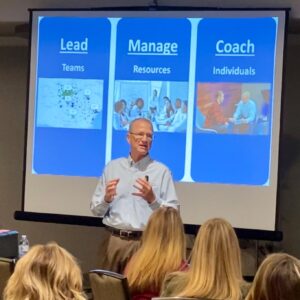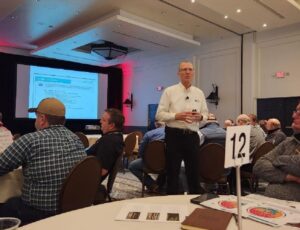The Mundane, the Work, The Planning, The Extra Effort or
Whatever you want to call it.
This is Part 3 of a 5-part series on the Five Sales Killers. See previous articles at:
“Oh, I could never be a salesperson” people often tell me when I explain that I run a sales training and coaching service. “Why,” I ask. “Well, you know. Meeting people and having the gift of gab. Knowing how to say just the right thing. I’m not a pushy person.” I understand what they are saying and I understand their only experience with a salesperson might be when they buy a car, house or appliance. A very different selling environment than the one we face in Agribusiness. Ag sales are long-term relationships that can last an entire career. In some cases, the salesperson knows more about parts of the customer’s business than the customer. An agronomist, nutritionist or vet is often considered part of a producer’s informal board of directors.
What does all this have to do with the Mundane of selling? Let me explain it this way: Selling is hard work. Put in the work and you get more sales. Don’t put in the work and you might get lucky for a while, but eventually, your lack of hard work will show. That’s when we complain about price, or our customer’s intelligence or the new credit policy is killing our sales. In reality, the problem is not putting in the work to find out how we can continue to make sales and margin when times are tough.
There is one little twist in here that confuses a salesperson and their manager. That twist is that putting in the hard work doesn’t guarantee a sale. We can do everything right and still not get the sale. We do our pre-call plan. We ask a lot of high-value questions. We present just the right product and ask a specific closing style question. Then we wait in silence for the answer. And then…. The prospect informs you that his son sells for your competition and he has to buy from him. Or she is locked into a 2-year contract with the competition. Or, she just doesn’t want to make a change right now.
This confuses a salesperson into thinking the hard work isn’t worth the effort. They think, “I can just wing it and get the same results.” This turns into a slippery slope of “winging it” all the time. As mentioned, you might get away with it for a while, but you are leaving the door open for a competitor who comes along and does the hard work. On the other side, I really enjoyed finding a prospect that had a salesperson who was getting lazy, taking them for granted and not putting in the work. It made selling that prospect easy.
So, what are some of the Mundane hard work areas you might want to think about? Below are those areas that I see most salespeople take costly shortcuts on.
- Pre-call planning: It’s much more fun to be out making sales calls than sitting in your office drawing up plans. But, it makes the sales call so much better. Plus, your customer will appreciate that you followed up on everything from the previous call and you have a plan for this call.
- Following an agenda: I didn’t say a written agenda that you give to the customer, but that’s not a bad idea. An agenda means you have a purpose for the call. As the years go by, calling on customers turns into too much of a social visit. Little if any business is actually done on the call. An agenda will help you stay on track and focus on the purpose of adding value to your customer’s business.
- Asking high-value questions, digging into the customer’s business and improving it: See my comments in the previous about social visits. Too much familiarity with our customer gives us the false impression that we know everything about their business. We stop asking questions and soon we aren’t offering solutions to their problems.
- Getting organized and having a plan: Again, it’s much easier to just wing it. It’s much more fun to be driving the country calling on customers than in our office figuring out how to make more sales. The problem is the more disorganized or random you are, the fewer customers you can call on. And based on my unofficial non-medical opinion, disorganization is not a gene or part of your DNA. Get over the procrastination and get it done.
- Developing your CRM to be useful: It’s much easier to just continue using your old approach and not work with the new CRM program. But, a little up-front work of building a few dashboards and entering customer info and you have a very powerful tool to keep you organized.
- Customer segmentation: I separated this out of “getting organized” due to it’s importance. Initial methods of segmentation are based off your customer’s financial importance to your territory. You can use the A, B, C method of segmenting customers or possibly the 80:20 list. Whichever you use, take your customer list and see where you are spending your time and effort. If it’s not with the A group or the top 20% that generate 80% of your business, stop it! Focus on the highest return. In the rare case that you don’t have sales volume or financial awareness of your customers, then that’s a very important place to start organizing. Again, this isn’t exciting stuff, but neither are the results of calling on C accounts.
- Administrative: “Don’t we have someone that can do that for us?” Maybe, but it’s still your responsibility to make it happen. These are things like getting signatures on contracts, getting paperwork filled out so financing or credit can go through, or making sure the delivery instructions get to the right person in your distribution department. These are not as exciting as going to a trade show to find prospects, but they are part of those mundane tasks that kill sales if you don’t do them.
- Solving administrative, operations or distribution issues: This is critical. Problems are going to happen as no company is perfect. When they happen to your customer, jump in with both feet. You sold the customer and then the product or your company didn’t perform as expected. Get good at dealing with these issues and your customer will trust that you will live up to your promises. Run from these issues and the opposite is true. Going back to the feed mill and fixing an invoice is not nearly as exciting as talking with a dairy prospect about increasing butterfat levels on his herd, but you have a paying customer relying on you. Don’t make them an ex-customer by “forgetting” to take care of the invoice.
TV often shows the salesperson as having that clever one-liner or tactic that gets the sale. Social media experts will tell you they have the secret formula to “close every sale”. Never do they expound on the hard work it takes or that you keep the customer by out-working the competition. The epitome of this is when I hear someone say, “she could sell ice to Eskimos!” I get the intention of the comment. She’s a good salesperson. However, it gives a false impression of what a good salesperson does. It makes it sound like they use verbal trickery to get someone to buy ice when they are surrounded by it.
Maybe next time say,
“He could sell ice to someone in the desert by figuring out how to get Eskimos to set up a distribution system with refrigerated semis at a reasonable rate to people who could afford it. Then he put in the work of expanding his product line to include coolers and ice packs.”
Doesn’t sound as exciting as “ice to Eskimos” but it’s much more sustainable and profitable.
Join me next time as we deal with the Sales Killer #4: Belief



